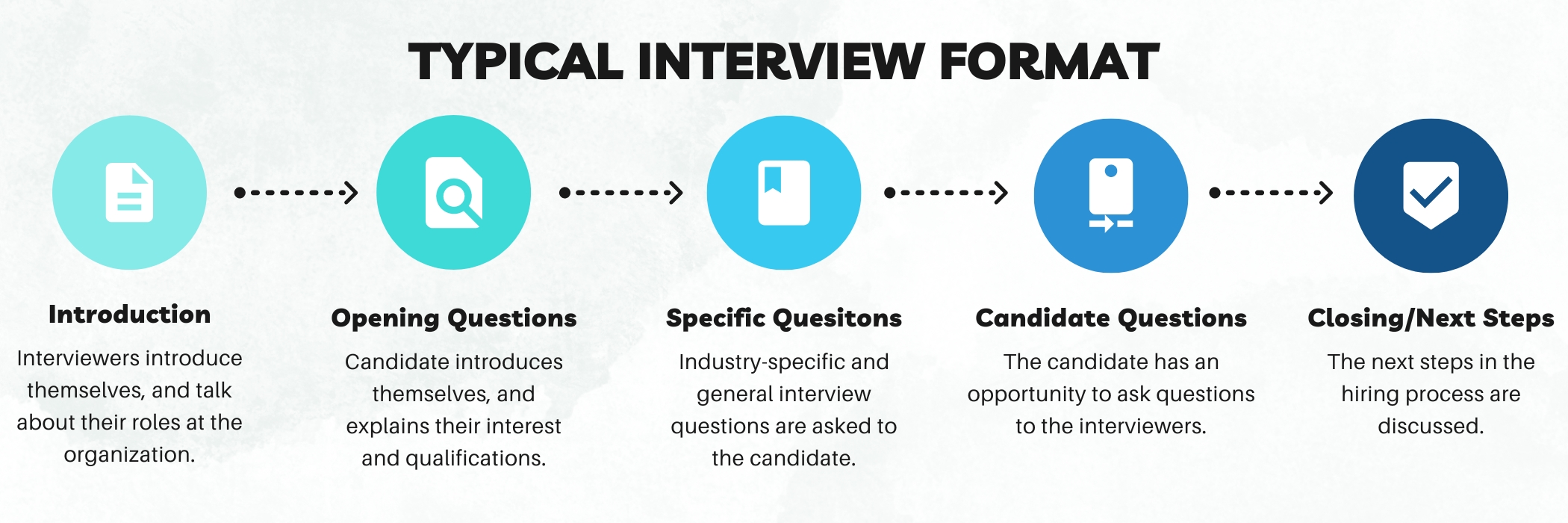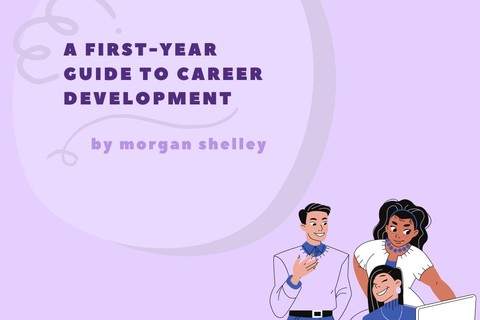Preparation is vital to help you conduct a successful interview and to help you feel self-confident.
-
Before the Interview
Know the job requirements. Identify the key skills, qualities and experiences that the position requires. Review your work, volunteer, and academic background to identify experiences where you have developed and displayed these skills and abilities.
Research the Company. Researching the company allows you to get an understanding of your audience so you can best tailor your answers in an interview. It is hard to make the argument that you’re the best candidate for the position if you don’t know about the place you’d be working at!
- Places to look: Job Posting, Company Website, Handshake, LinkedIn, Glassdoor, Talk with Alumni
- What to look for: Organizational Structure, Potential Career Paths, Office Locations, Products/Services, Competition, Mission, Vision, Values, Candidate-Reported Interview Questions (Glassdoor), Diversity of Staff/Administration
Manage Your Nerves. It’s okay to be nervous! If you got the interview, the employer believes you are qualified, so have faith in yourself (even when you don’t see it). If you’re worried your nerves will impact your performance, practice deep breathing.
Practice for the interview. By anticipating types of questions and practicing your responses, you will be better prepared to articulate your skills and strengths during an interview. Forms of practicing:
- A friend, a professional colleague, or a professor can give clear, honest feedback about your answers and your nonverbal behavior.
- Make an appointment for a mock interview or interview coaching with the Career Development Center.
-
Introductions & Opening Questions
In the introduction and first few questions, the interviewer(s) may take some time to tell you a bit about them, including their roles at the organization. When it comes time for you to introduce yourself, they will ask some version of the question: “Tell me about yourself.”
To answer this question, we recommend the following format:
- Start with the present. Talk about who you are professionally. Are you a student? If so, what year are you? What do you study? If you have a full-time job, what role do you have? What are you interested in?
- Give context. Talk about past/present roles, experiences, and accomplishments that are relevant to what you are interviewing for.
- End with the future. Talk about why this role/opportunity is a logical next step.
Note: If you are making a career transition, find commonality between the experience you have and the role you’re hoping for, and discuss the transferable skills.
Example: “I’m currently a second-year student at St. Kates, where I am majoring in graphic design with a minor in Digital Humanities. I’m currently serving as an R.A. in one of our dorms, where I’ve been able to put my passion for content creation to use when designing resources for the students I assist. I’m excited to merge my passion for graphic design with my interest in community development in this role.”
Other Common Introduction Questions
Regardless of if these questions are asked or not, it’s helpful to have an understanding of your answers before you interview.
“Why are you interested in this position?”
What they are looking for: Talk about what responsibilities and components of the job are attractive, and how you have developed the skills to meet the requirements of the job.
“What makes you qualified for this position?”
What they are looking for: Articulate your skills with examples of situations where you demonstrated the abilities they seek and the successes you have had.
-
Common Interview Questions
While interview questions may differ across industries, there may be some common questions to keep an eye out for.
For a list of general interview questions and how to answer them, click here.
For industry-specific examples, you can view this resource created by the Macaulay Honors College or look at the following resources:
- Nursing. Interview Questions by Nurse.org.
- Teaching/Education. Interview questions by UMN.
- Glassdoor. Glassdoor has a feature that allows previous interviewees to post the questions that they were asked in the interview.
- Professional Associations. Professional Organizations often have career information, which may also include common interview questions.
Additionally, it’s important to be prepared if you are asked about salary/pay expectations. It is preferred to wait to discuss salary until you have been offered the position, since you know that they want to hire you. If you are asked about salary during the interview process, you can respond:
- Could you share the typical range for this role?
- This gives you the opportunity to see what they have budgeted for the position. Always advocate for being paid on the higher end of the range.
- I’d like to learn more about the role before I set my salary expectations. As we move forward in the interview process I would hope and expect that my salary would line up with market rates for similar positions in this area.
- Based on my understanding of the market, positions like this typically pay in the X – Y range. Based on [specific qualifications], I would feel comfortable closer to the Y range. That being said, I would love to learn more about the job, the benefits, and the work environment here. I can be flexible with salary for the right fit.
To learn more about salary negotiation, click here.
-
Behavior-Based Questions
How to answer the question that starts with “Tell me about a time when…”
Behavior-Based Questions are questions that ask about a specific time/situation where you demonstrated a skill, quality, and/or behavior.
In asking these questions, the interviewer is looking for details about how you behave in certain situations. So, to answer them, it’s important to think about what skills and attributes the employer wants to see in a successful candidate (e.g. communication, problem-solving, leadership, etc.).
To successfully structure your answer to a behavior-based question, include each of the following elements: Situation, Task, Action, Results.

How to prepare stories: Choose based on key skills required by the job . Prepare 1 story per each key skill/experience listed in the job description.
Example: If you are asked to describe a situation in which you had to work as a member of a team, your answer might include the following elements:
Situation: I was taking a biology class last semester, where we put together a presentation on our experiment. My group was struggling to communicate, and was beginning to stress about the upcoming deadline.
Task: As the group leader, it was my responsibility to help the group get on the same page, so we can finish the project on time.
Action: I organized a special group meeting to discuss what was keeping our group from effectively collaborating, and realized that some group members were not feeling heard. By bringing the topic out in the open, we were able to discuss it and move forward with the project.
Results: We were able to finish on time, receiving an ‘A’ on the project and solid feedback from classmates on the presentation.
Common Mistakes:
- Spending too much time on the background information, and not enough on your actual actions, such as how you got to the solution or what you did to resolve the conflict.
- Think of STAR like a burger. If you’ve every had a burger (meat or otherwise) that has an oversized bun, you know that it takes away from the experience of eating a burger. This is what it’s like when there is too much context given in a STAR answer. The S and T are the top bun, the A is the patty, and the R is the bottom bun. You don’t want a bun to overpower the burger–keep it just large enough to make it easy to grasp. You want the A to be the most detailed–it should be juicy and informative. The R should be just big enough to wrap things up.
- Forgetting about the result. It can be just 1-2 sentences.
-
Candidate Questions
Asking questions at the end of the interview is arguably one of the most important parts of the interview–not for the interviewer, but for the candidate. Asking questions at the end allows you to gather information about the work, company’s culture, and organization. Think of this as an opportunity for you to interview the interviewer!
Prepare 3-5 questions to ask the interviewer at the end of the interview. These questions are just a few examples of the type of questions that you can ask:
- In a typical day, what does [open role] do?
- What’s the biggest challenge the new [open role] can help solve?
- Can you tell me about the most difficult client situation you’ve faced in the last six months?
- I imagine that [innovation at the company or change in the industry] will change how you’re working on [project or product]. How are you developing your workforce to keep up with this?
- What’s different about working here than about anywhere else you’ve worked?
- Can you tell me about a time when someone was encouraged to step outside the confines of their job description?
- How does your organization promote a healthy work/life balance for their employees?
If you would like some assistance with coming up with questions, take this work values assessment and get questions based on what you value the most.
We recommend you time your last question to be: What are the next steps in the hiring process? This creates a smooth transition into wrapping up the interview.
-
Closing/After the Interview
Thank You Notes. Sending a professional thank you note is an important courtesy. Try to send the note within 24-48 hours of the interview. The content should be clearly written, professional in tone, and carefully proofread. Try to include specific information that was discussed in the meeting.

As a job candidate, there are laws protecting you against discrimination on the basis of race, ethnicity, color, sexual orientation, gender, religion, national origin, disability, age, marital status, family status, pregnancy, and birthplace. Additionally, some states have protections against discrimination based on salary history (Minnesota is not one of them–click here to see a full list).






